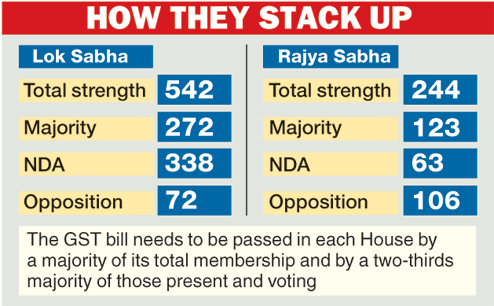New Delhi, Aug. 8: The Centre is considering calling a special session of both Houses of Parliament to pass the GST bill, touted as the expression of its vaunted commitment to second-generation economic reforms.
The Constitution (122 Amendment) Bill 2014 will empower Parliament and state legislatures to frame laws for the imposition of a goods and services tax. But it has been stalled by Opposition disruption of the monsoon session, which has just four working days left.
Sources said the Centre was looking at a three or four-day sitting sometime between the end of the monsoon session on August 13 and the Bihar elections, expected in end-October.
Within this two-month window, the government has to offset the gap in the Rajya Sabha, where the UPA's 106 votes vastly outstrip the NDA's 63. Calling a joint session to make up the difference is not an option because a Constitution amendment bill has to pass separately in each House.
Sources said the BJP was eyeing the "neutral" Samajwadi Party (15 members), Trinamul (12), AIADMK (11), Biju Janata Dal (6), Nationalist Congress Party (6), Independents (7), and several one-member parties such as the Janata Dal Secular, Jharkhand Mukti Morcha and the Indian National Lok Dal, adding up to a maximum 65 votes.
Prime Minister Narendra Modi's lunch meeting with Jayalalithaa in Chennai yesterday was intended to clear her reservations about the GST bill. But whatever its success with the "neutral" members, several hurdles complicate the government's path.

One, the 10-member Bahujan Samaj Party might go with the Congress to underline its "secular" credentials and score points over its Uttar Pradesh adversary, the Samajwadis. Such a course would raise the UPA's strength to 116, just seven short of majority in a House with a current strength of 244.
Two, a Constitution amendment bill must be passed in each House by a majority of its total membership and by a majority not less than two-thirds of the members present and voting.
Although the current session has seen a weeklong Opposition boycott of the Lok Sabha, the UPA would know that its presence in the upper House would make it that much harder for the government to pass the GST bill.
In a full House of 244, the Centre would need 163 votes, which is possible only if at least 25 members from the UPA and its friends switch sides.
On the other hand, if the Opposition continues to disrupt proceedings, it may be able to block the bill's introduction or passage - unless the government gets the marshals to throw its 100-odd members out.
If the government decides to go ahead with the special session proposal, it has to start next Thursday by adjourning the Houses sine die (indefinitely) but not proroguing them, as it usually does a few days later.
This will give it the leeway to summon the Houses for a special session at a time of its choosing.
If a special session is called, the Rajya Sabha will take up the bill and vote on the amendments suggested by a select House panel. If the bill passes, it will be forwarded for passage to the Lok Sabha, where the government has the numbers.
The lower House had indeed passed the bill during the second leg of the budget session but the numerically dominant Rajya Sabha Opposition had it sent to the select committee on the understanding that it would give its report by the time the monsoon session opened.
But right from the start of the new session, the Congress has refused to let the Houses function unless foreign minister Sushma Swaraj and certain BJP chief ministers, embroiled in controversies, resign.










